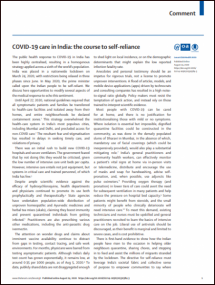COVID-19 Care in India: The Course to Self-Reliance
The public health response to COVID-19 in India has been highly centralized, resulting in a homogenous strategy applied across a sixth of the world’s population.
India was placed in a nationwide lockdown on March 24, 2020, with restrictions being relaxed in three phases since June. In May 2020, the prime minister called upon the Indian people to be self-reliant. The authors discuss opportunities to modify several aspects of the medical response to echo this sentiment.
They conclude that what is still needed is a plethora of low-tech solutions (especially facial coverings), adherence to science, and societal participation in caring for vulnerable people.
Source: The Lancet
Date of Publication: August 31, 2020
SIMILIAR RESOURCES
Tools
Examples
- Physical Distancing, Face Masks, and Eye Protection for Prevention of COVID-19
- Who Self-Cares Wins
- The Public’s Role in COVID-19 Vaccination: Planning Recommendations Informed by Design Thinking and the Social, Behavioral, and Communication Sciences
- An Exploration of How Fake News is Taking over Social Media and Putting Public Health at Risk
- Pandemic Fatigue Reinvigorating the Public to Prevent COVID-19
- Key Guidelines in Developing a Pre-Emptive COVID-19 Vaccination Uptake Promotion Strategy
- Agissons Maintenant / Seizing the Moment
- Covid-19: What Do We Know about “Long Covid”?
- A Guide to WHO’s Guidance on COVID-19
- Building Resilient Societies after COVID-19: The Case for Investing in Maternal, Neonatal, and Child Health
- Providing Maternal Health Services during the COVID-19 Pandemic in Nepal
- COVID-19 Vaccine Communication Strategy, India
- 7 Acts of Self-care You Can Practice during a Winter Lockdown
- Sustaining Access to Voluntary Reproductive Health Care in East Africa: Insights from the COVID-19 Task Force
- SBC Resources for India

